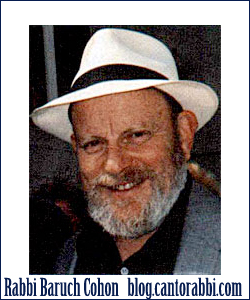A RABBI’S FAMILY – by Rabbi Baruch Cohon
This week’s blog is not a comment on the Torah portion. Not that this week’s reading is dull. Anything but. It tells the story of Korach — a bitter rebellion within the Israelite camp in the desert. Plenty of commentary is already available on it. I just happen to be otherwise occupied.
Recently the death of a prominent Israeli rabbinical figure prompted publicity about his family. It is a very big family, and he lived to see four generations of his descendants. According to the reports, they number somewhere around 1,000 individuals. Of course they include both blood relatives and in-laws. Still, a goodly number.
I would estimate that his extended family – those whose lives he touched – numbered many times that total. And that estimate holds true for other rabbis who are much less prominent. The Jews we guide through life-cycle events (Bar Mitzvah, wedding, bris, Torah study, illness and funerals and mourning), the Jewish students who come to us for instruction, the religious searchers who consult us for a way into Judaism, the litigants who demand our services on a Halachic court, the activists who join us in supporting a worthy cause, and, yes, even those who engage in public debate against us – all become part of our extended families.
Over the years I am grateful for the experience of having young people who once sang in my junior choir, or whose coming-of-age services I once conducted, come back to me ten or fifteen years later for their weddings. At a recent funeral a middle-aged brother and sister insisted on taking a picture with me to show their aging parents, because I once officiated at their bar mitzvah and wedding services. Something we shared was important to them and they want to honor it. In doing so, they honor me. Bless them.
All this nakhes – this pleasure – does not come without some tzores – some trouble. What did you expect?
In your immediate family your children sometimes misbehave, sometimes disagree with you, criticize you, rebel. Don’t they? After all, if my wife and I frequently cancel out each other’s vote at election time, what can we expect of our children?
Extended families and professional families only extend those differences. All of which brings to mind a happy occasion and its sidelights.
I had the privilege of conducting a wedding in a family I have been connected with for over 60 years. The young bride is bright and beautiful, and very positively Jewish. Her groom is a fine choice for her, and brings a fine family background and a strong commitment to their union. They did not rush into marriage, but went together long enough to know each other well. Their ceremony attracted friends and relatives from near and far, and the dinner and dancing afterwards lasted well into the night. Vigorous horas, with the wedding couple and their parents hoisted on chairs, and the usual shouts and applause. Toasts and presents – the whole shmeer, as they say!
Did I do a good job? The bride and groom thought so, at least they said so. Presumably they listened to a few of the words I said to them under the wedding canopy.
But I left something out. I did not mention the name of one deceased member of the family – actually a man who was a good friend to me in his time. Although I thought of him and how he would enjoy this wedding, the bride never knew him, and I was speaking to her. So I did not mention him there. I heard disappointment about that omission, and I regret it. Just one example of how tzoris mixes with nakhes.
Other episodes are more extreme. More than once in setting up a wedding procession, I heard a lady protest: “I’m not standing with him!” Nothing ever seems to quiet intra-family conflict, in fact asimha can sometimes aggravate it.
If it can happen in a celebrating family, how much more likely for conflicts to complicate a community activity. We still have a lot to learn about getting together for a common purpose.
Today we see some alarming disarray in family life. Up to now the family is the basic unit of every society, whether tribal or industrial. Congregation and community, neighborhood and nation – all follow in logical growth. We don’t all have to agree, but we have to live together and work together. When we please and inspire each other – and even when we disagree or disappoint – we need to connect. To be concerned.
Every rabbi can look around and maintain some kind of connection with the extended family assembled by his life’s work. Maybe this blog will reach some of my “nephews and nieces!” Welcome home…


